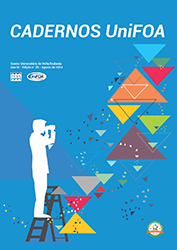Aplicações fuzzy em estudos da Covid-19
um panorama bibliométrico
DOI:
https://doi.org/10.47385/cadunifoa.v18.n52.4352Keywords:
Covid-19, Fuzzy logic, Bibliometrics, Mathematical models, Decision makingAbstract
Covid-19, due to its high transmission rate, caused the World Health Organization to declare a state of pandemic, its circulation generated many economic, health and psychosocial consequences, which created the need for quick and assertive actions by the competent authorities. Decision-making tools, such as predictive mathematical models, are necessary to mitigate the risks involved in decisions in times of a pandemic. The objective of this research is to verify, through bibliometrics, whether the scientific community has used fuzzy logic, which becomes convenient in the face of uncertainties, applied to studies of Covid-19 in Brazil and in the world. Biliometric surveys can be useful as they measure several variables of research published in scientific journals around the world and through scientific databases, therefore, they are tools that help direct possible new research and monitor the evolution of the topics under study. Among the observations made in this research, it was seen that at the time of data extraction and with the adopted criteria, that Brazil had only 10 publications of Covid-19 studies with the use of fuzzy logic, which can be considered little if compared to Asian countries such as China and India, for example, so it is possible that there is a lot of space for research in our country that addresses the subject.
Downloads
References
BATISTELA, G. C.; SABBATINO, L. A.; SIMÕES, D. Avaliação econômica de projeto: uma abordagem da lógica fuzzy para tomada de decisão. C.Q.D.- Revista Eletrônica Paulista de Matemática, v. 17, p. 255–266, fev. 2020. Disponível em: <https://www.fc.unesp.br/Home/Departamentos/Matematica/revistacqd2228/v17a20-avaliacaoeconomica-de-projeto-uma-abordagem.pdf>. DOI: https://doi.org/10.21167/cqdvol17ermac202023169664gcblasds255266
BRASIL. Coronavírus. Disponível em: <https://www.gov.br/saude/pt-br/coronavirus/o-que-e-o-coronavirus>. Acesso em: 28 set. 2022.
GUEDES, V. L. S.; BORSCHIVER, S. Bibliometria : Uma Ferramenta Estatística Para a Gestão Da Informação E Do Conhecimento , Em Sistemas De Informação , De Comunicação E De. CINFORM - Encontro Nacional de Ciência da Informação, p. 1–18, 2005. Disponível em: <http://dici.ibict.br/archive/00000508/01/VaniaLSGuedes.pdf>.
MORRIS, S. A.; GOLDSTEIN, M. L. Manifestation of research teams in journal literature: A growth model of papers, authors, collaboration, coauthorship, weak ties, and Lotka’s law. Journal of the American Society for Information Science and Technology, v. 58, n. 12, p. 1764–1782, out. 2007. Disponível em: <http://onlinelibrary.wiley.com/doi/10.1002/asi.22883/abstract>. DOI: https://doi.org/10.1002/asi.20661
SHIA, C. SEN; COSTA, I. Sistema fuzzy para análise de riscos em projetos de software através dos atributos da norma de qualidade iso 25000. Revista Produção Online, v. 14, n. 1, p. 321, 15 fev. 2014. Disponível em: <http://producaoonline.org.br/rpo/article/view/1620>. DOI: https://doi.org/10.14488/1676-1901.v14.i1.1620
SILVA, N. F. DE C. DA et al. Fuzzy Visa: um modelo de lógica fuzzy para a avaliação de risco da Vigilância Sanitária para inspeção de resíduos de serviços de saúde. Physis: Revista de Saúde Coletiva, v. 27, n. 1, p. 127–146, jan. 2017. Disponível em: <http://www.scielo.br/scielo.php?script=sci_arttext&pid=S0103-73312017000100127&lng=pt&tlng=pt>. DOI: https://doi.org/10.1590/s0103-73312017000100007
SOARES, P. B. et al. Análise bibliométrica da produção científica brasileira sobre Tecnologia de Construção e Edificações na base de dados Web of Science. Ambiente Construído, v. 16, n. 1, p. 175–185, jan. 2016. Disponível em: <http://www.scielo.br/scielo.php?script=sci_arttext&pid=S1678-86212016000100175&lng=pt&tlng=pt>. DOI: https://doi.org/10.1590/s1678-86212016000100067
SUELA, S. C.; MORETO, E. R.; FREITAS, R. R. DE. Bibliometria e seus Métodos de Pesquisa: Um Estudo nas Bases de Dados Scopus e Web of Science. Revista FSA, v. 18, n. 6, p. 151–168, 1 jun. 2021. Disponível em: <http://www4.unifsa.com.br/revista/index.php/fsa/article/view/2302/491492842>. DOI: https://doi.org/10.12819/2021.18.6.8
Downloads
Published
How to Cite
Issue
Section
License
Copyright (c) 2023 Cadernos UniFOA

This work is licensed under a Creative Commons Attribution-NonCommercial-ShareAlike 4.0 International License.
Declaração de Transferência de Direitos Autorais - Cadernos UniFOA como autor(es) do artigo abaixo intitulado, declaro(amos) que em caso de aceitação do artigo por parte da Revista Cadernos UniFOA, concordo(amos) que os direitos autorais e ele referentes se tornarão propriedade exclusiva desta revista, vedada qualquer produção, total ou parcial, em qualquer outra parte ou meio de divulgação, impressa ou eletrônica, sem que a prévia e necessária autorização seja solicitada e, se obtida, farei(emos) constar o agradecimento à Revista Cadernos UniFOA, e os créditos correspondentes. Declaro(emos) também que este artigo é original na sua forma e conteúdo, não tendo sido publicado em outro periódico, completo ou em parte, e certifico(amos) que não se encontra sob análise em qualquer outro veículo de comunicação científica.
O AUTOR desde já está ciente e de acordo que:
- A obra não poderá ser comercializada e sua contribuição não gerará ônus para a FOA/UniFOA;
- A obra será disponibilizada em formato digital no sítio eletrônico do UniFOA para pesquisas e downloads de forma gratuita;
- Todo o conteúdo é de total responsabilidade dos autores na sua forma e originalidade;
- Todas as imagens utilizadas (fotos, ilustrações, vetores e etc.) devem possuir autorização para uso;
- Que a obra não se encontra sob a análise em qualquer outro veículo de comunicação científica, caso contrário o Autor deverá justificar a submissão à Editora da FOA, que analisará o pedido, podendo ser autorizado ou não.
O AUTOR está ciente e de acordo que tem por obrigação solicitar a autorização expressa dos coautores da obra/artigo, bem como dos professores orientadores antes da submissão do mesmo, se obrigando inclusive a mencioná-los no corpo da obra, sob pena de responder exclusivamente pelos danos causados.










